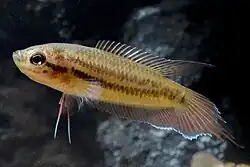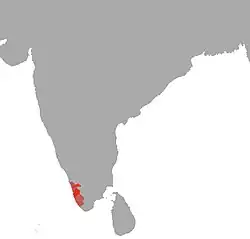Pseudosphromenus dayi
| Pseudosphromenus dayi | |
|---|---|

| |
| Scientific classification | |
| Kingdom: | Animalia |
| Phylum: | Chordata |
| Class: | Actinopterygii |
| Order: | Anabantiformes |
| Family: | Osphronemidae |
| Genus: | Pseudosphromenus |
| Species: | P. dayi
|
| Binomial name | |
| Pseudosphromenus dayi (Köhler, 1908)
| |

| |
| Red:extant, Light red: possibly extant | |
| Synonyms[2] | |
| |
Pseudosphromenus dayi or Indian spiketail betta is a species of freshwater ray finned fish from the subfamily Macropodusinae, part of the gourami family Osphronemidae. It occurs in Kerala on both the coastal regions and the Western Ghats.[1] It is a species of still or slow flowing waters, especially lakes, ditches and swamps[2] in both fresh and brackish waters. Pseudosphromenus dayi is a bubble nester, the male creates a nest made of bubbles under an overhang or a leaf. The females lays eggs which drop to the substrate and are picked up by both fishes in the pair and placed in the bubble nest.[1] The name Polyacanthus cupanus dayi was first published in 1908 by Köhler in 1908 but Catalog of Fishes refers to this as a nomen nudum and attributes the valid use of the name, with a formal description, to P. Engmann in 1909. The type locality is given as Malacca which is probably an error and should be Kerala.[3] The specific name honors the British ichthyologist and author of the Fishes of India, Francis Day (1830–1889).[4]
References
- ^ a b c Dahanukar, N.; Rema Devi, K.R. (2020). "Pseudosphromenus dayi". IUCN Red List of Threatened Species. 2020: e.T169623A177056991. doi:10.2305/IUCN.UK.2020-3.RLTS.T169623A177056991.en. Retrieved 12 November 2021.
- ^ a b Froese, Rainer; Pauly, Daniel (eds.). "Pseudosphromenus dayi". FishBase. August 2019 version.
- ^ Eschmeyer, William N.; Fricke, Ron & van der Laan, Richard (eds.). "Polyacanthus cupanus dayi". Catalog of Fishes. California Academy of Sciences. Retrieved 19 December 2019.
- ^ Christopher Scharpf; Kenneth J. Lazara (21 October 2019). "Order ANABANTIFORMES: Families ANABANTIDAE, HELOSTOMATIDAE, OSPHRONEMIDAE, CHANNIDAE, NANDIDAE, BADIDAE, and PRISTOLEPIDIDAE". The ETYFish Project Fish Name Etymology Database. Christopher Scharpf and Kenneth J. Lazara. Retrieved 18 December 2019.
